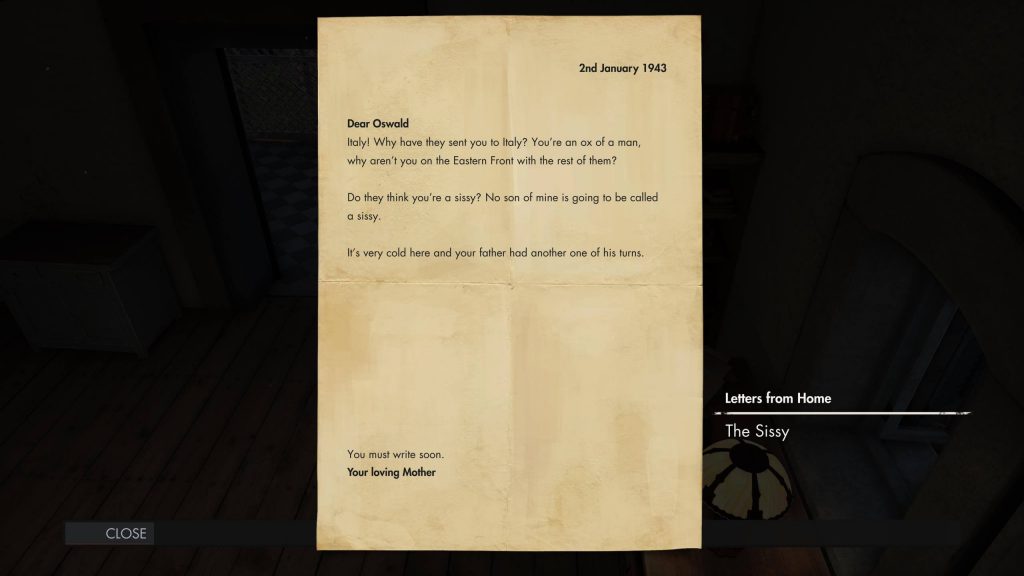Allow Players to Uncover Additional Story Details if Desired
On this page
Some players are not interested in revealing every detail of the story and prefer to enjoy only the main storyline or participate in specific in-game activities. Conversely, some players are deeply invested in understanding all aspects of the narrative.
For players who are interested in uncovering every detail of the story, provide supplementary content such as notes, documents, and other sources of information. These players may be offered one or more of the options described below. These methods allow for deeper exploration of the narrative without obligating the player to engage with them. Ideally, these options should be distributed evenly throughout the story and should not be overly difficult to discover.
Since players may occasionally need to revisit certain story-related information, ensure they have the ability to access this content, for example, through in-game menus or their inventory system.
Additional Conversation Options
This option becomes relevant when players are permitted to make choices during conversations—either by selecting a question or providing a response to the character they are interacting with. During such interactions, one or more dialogue choices may be used to inquire further about characters, locations, or points of interest.
These additional conversation choices can become available after players fulfill certain conditions, such as:
Gaining the trust of the character with whom they are speaking.
Earning the respect of the faction to which that character belongs.
Acquiring a specific perk or ability.
Achieving a certain level of virtual experience in speech or persuasion.
Backstories
A backstory, or background story, reveals information about the events that preceded the main storyline. Backstories provide context by presenting details about historical events, important characters, and key settings.
Databases
A database contains information about the game world that players can access at any time. The database may be implemented in one of the following two formats:
The first format provides complete access to all information immediately upon launching the game. Players can consult it at any time to learn everything they need to know.
- The second format initially provides access only to a limited set of information relevant at the beginning of the game. As players explore the game world and encounter new characters, abilities, levels, and events, additional entries are added to the database over time.
Multimedia
Multimedia sources may include videos, presentations, or audio recordings.
In Gone Home, players can find a telephone with an answering machine that allows them to play back voice messages left by missed callers.
Credit: The Fullbright Company. Footage captured by the author.
In Gone Home, there is also a menu where players can listen to audio recordings they have discovered during the course of the game.
Credit: The Fullbright Company. Footage captured by the author.
Papers with Information
These may include a variety of written materials, described below:
Books and Magazines
In Gone Home, players can find various books, including ones whose covers can be examined for additional narrative context.
Credit: The Fullbright Company. Footage captured by the author.
Correspondence
Types of correspondence may include:
Letters (Sniper Elite 4).
Postcards (Gone Home).
Text messages (Simulacra).
Fax messages.
Emails (Fallout 4).
Voicemails (Gone Home).
Invoices (Gone Home).
Press releases.
In Gone Home, players can find letters and postcards.
Credit: The Fullbright Company. Footage captured by the author.
In Sniper Elite 4, players may discover letters addressed to characters, such as one addressed to Oswald.
Credit: Rebellion Developments. Screenshot captured by the author.
Documents and Files
Here are examples of documents and files that may be included in games:
Case files (Control).
Contracts.
Records (Control).
Reports (Control).
Financial documents.
In Gone Home, various documents appear that enrich the narrative and provide a deeper understanding of the story when read.
Credit: The Fullbright Company. Footage captured by the author.
Labels
In Gone Home, players can examine the labels on objects, such as boxes, to gain additional context or information.
Credit: The Fullbright Company. Footage captured by the author.
Notes
In Gone Home, notes are present that contain important story details and contribute to narrative development.
Credit: The Fullbright Company. Footage captured by the author.
Side Quests
Side quests are secondary objectives that can introduce new characters or locations. These optional missions allow players to explore the game world more thoroughly and obtain a deeper understanding of the story.
For further details on side quests, refer to the section Secondary Objectives.

